
The Supreme Court has allowed emergency abortions to continue in Idaho, marking a temporary victory for abortion rights advocates. According to NBC News, the court refrained from making a definitive ruling on whether Idaho's stringent abortion ban conflicts with a federal law that mandates stabilizing care for emergency room patients, including pregnant women with complications that may necessitate abortions. This leaves the legal question unresolved for now.
In a report by BBC News, the justices dismissed the appeal from Idaho officials, thereby maintaining a lower court ruling that permits doctors in the state to perform abortions in emergency situations. The decision, supported by a mix of conservative and liberal justices in a 6-3 vote, offers temporary protection for doctors who determine that an abortion is the best treatment for a patient in jeopardy. However, the court did not address the substance of the case, focusing instead on procedural grounds.
Attorney General Merrick Garland emphasized that the Justice Department would continue to push its interpretation of the federal law, ensuring women in Idaho have access to emergency care as guaranteed under federal statutes. Garland said, "Today's order means that, while we continue to litigate our case, women in Idaho will once again have access to the emergency care guaranteed to them under federal law."
Justice Ketanji Brown Jackson, dissenting from the court's decision to dismiss the case, expressed strong dissatisfaction. She argued that the conflict between state and federal law remains unresolved and criticized the court for not addressing the issue now. Her sentiments were echoed by abortion rights activists like Nancy Northup, president of the Center for Reproductive Rights, who noted that the decision left women and healthcare providers in a state of uncertainty.
Idaho's abortion law, which was enacted in 2020 and took effect in 2022 following the overturning of Roe v. Wade, criminalizes most abortions throughout pregnancy with limited exceptions. These include cases of rape, incest, nonviable pregnancies, and situations where the abortion is necessary to prevent the death of the pregnant woman. Violations of this law can result in severe penalties for healthcare providers.
The federal government, under the Biden administration, argued that the Emergency Medical Treatment and Labor Act (EMTALA) of 1986 requires hospitals to provide appropriate emergency care, including abortions when a woman's health is at risk. This federal law applies to healthcare providers receiving federal funding under Medicare. The case remains contentious, with anti-abortion activists claiming that the law is being misinterpreted by doctors.
The Supreme Court's decision is notable against the backdrop of its previous ruling two years ago, which rescinded the nationwide guarantee of abortion rights established by Roe v. Wade. This has led to a patchwork of state laws with varying degrees of access to abortion, and the ongoing litigation in Idaho is just one example of the legal battles playing out across the country.







